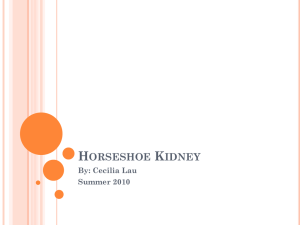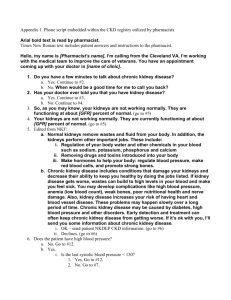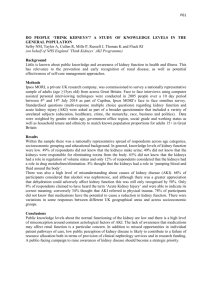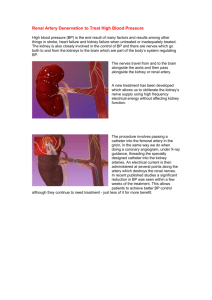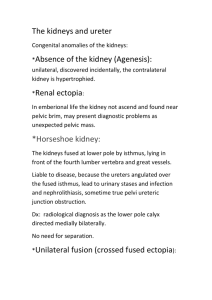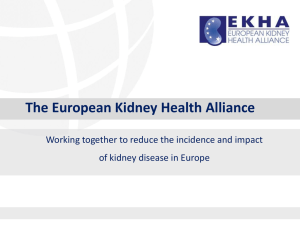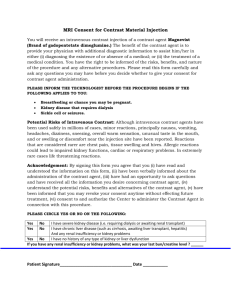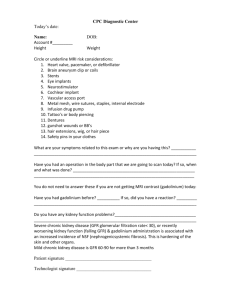script number 153 kidney failure
advertisement
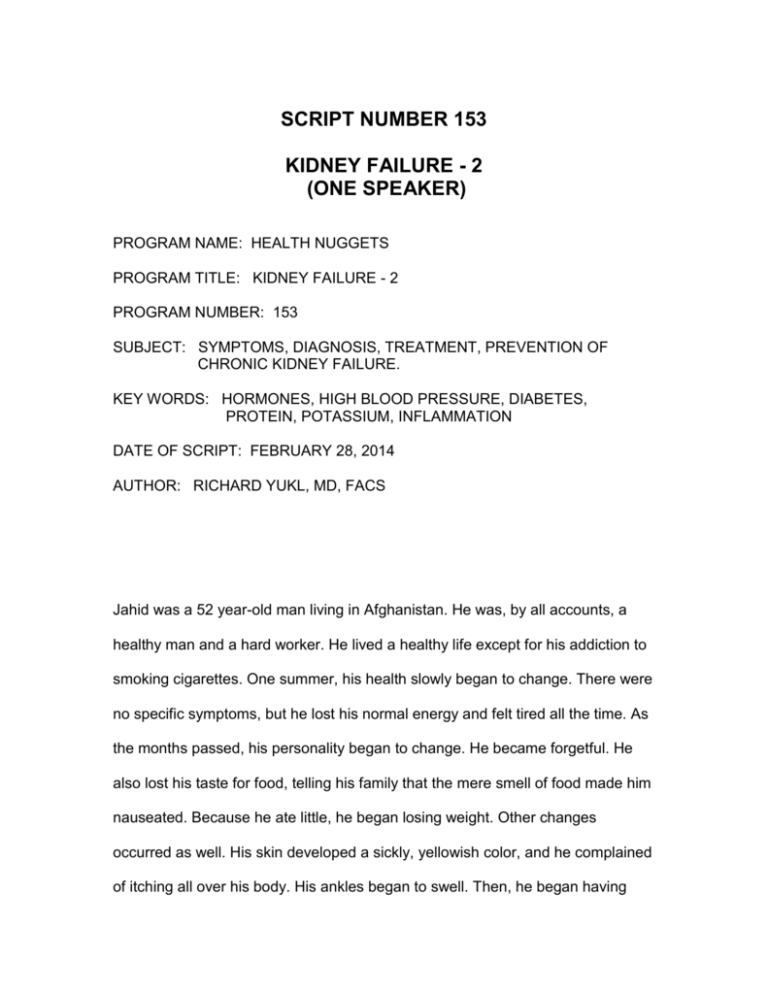
SCRIPT NUMBER 153 KIDNEY FAILURE - 2 (ONE SPEAKER) PROGRAM NAME: HEALTH NUGGETS PROGRAM TITLE: KIDNEY FAILURE - 2 PROGRAM NUMBER: 153 SUBJECT: SYMPTOMS, DIAGNOSIS, TREATMENT, PREVENTION OF CHRONIC KIDNEY FAILURE. KEY WORDS: HORMONES, HIGH BLOOD PRESSURE, DIABETES, PROTEIN, POTASSIUM, INFLAMMATION DATE OF SCRIPT: FEBRUARY 28, 2014 AUTHOR: RICHARD YUKL, MD, FACS Jahid was a 52 year-old man living in Afghanistan. He was, by all accounts, a healthy man and a hard worker. He lived a healthy life except for his addiction to smoking cigarettes. One summer, his health slowly began to change. There were no specific symptoms, but he lost his normal energy and felt tired all the time. As the months passed, his personality began to change. He became forgetful. He also lost his taste for food, telling his family that the mere smell of food made him nauseated. Because he ate little, he began losing weight. Other changes occurred as well. His skin developed a sickly, yellowish color, and he complained of itching all over his body. His ankles began to swell. Then, he began having significant trouble breathing. Even though access to medical care was difficult where he lived, Jahid’s family eventually became so concerned about his health that they made the several hour journey required to take him to a doctor. Tests identified that Jahid was suffering the late complications of chronic kidney failure. A few weeks following his diagnosis, Jahid’s family found him dead in his bed. He had silently died during the night. Today, I want to talk about chronic kidney failure. A kidney is the size of a fist, and we each have two kidneys, one located on either side of the back just below the ribcage. Kidneys were created as a sophisticated filtering mechanism used to remove dangerous waste products from our bodies and to keep our blood in chemical balance. Every day, they filter about 2000 liters of blood to sift out about 2 liters of waste products and excess water. In addition to filtering our blood, kidneys produce hormones that stimulate our bone marrow to make red blood cells, other hormones to regulate our blood pressure, and yet others that allow calcium to remain in our bones, keeping them strong. Chronic kidney failure is the condition in which our kidneys lose their ability to function properly. Sadly, the loss of function is usually permanent. Kidney damage begins slowly and silently. A small loss of function causes no symptoms, but once kidney function drops below 10-15 percent of normal, life-threatening health problems will develop. When symptoms occur, they are very similar to those experienced by Jahid. People notice changes in their health, but nothing specific. They may experience a change in how often they urinate, urinating either more or less often than normal. They may feel tired or drowsy and have trouble concentrating. They may lose their appetite and experience nausea and vomiting. Their hands and feet may swell and feel itchy or numb. Their skin may darken and they may develop cramps in their muscles. A doctor can, at times, make the diagnosis by merely examining the blood and urine, finding abnormal levels of waste products in the blood and proteins in the urine. It may, however, be necessary to take a small sample of the kidney for microscopic examination using a long, thin needle inserted through the skin. The two most common causes of chronic kidney failure are diabetes and high blood pressure. Since chronic kidney failure is permanent, treatment focuses on slowing progression of the kidney damage by controlling its underlying cause. If the underlying cause is diabetes, the doctor will instruct you in a proper diabetic diet, and may start you on taking insulin to bring your blood sugar levels back to normal. If the underlying cause is high blood pressure, you will be prescribed medicines to bring your pressure back to normal. You will also be required to limit your salt intake. Salt is probably the most important factor causing blood pressure to rise. It raises your blood pressure significantly. Limiting salt intake is extremely important because, over time, the elevated pressure will cause narrowing of the blood tubes leading to your kidneys, quickening the kidney damage. Another important concern in the treatment of kidney failure is lowering your protein intake. As your body processes proteins from the foods you eat, it creates wastes that your kidneys must remove. Lowering your protein intake will reduce the amount of work your kidneys must do to remove those wastes. Taking medicines and limiting salt and protein intake will slow progression of your kidney damage. Another dietary change that helps is to eat less potassium in your diet. Your kidneys must remove excess potassium from your body, so eating less potassium will make their job easier. A dietitian can help identify which foods are healthy and yet low in both protein and potassium. How can you lower your risk of developing chronic kidney failure in the first place? Avoid those things that lead to kidney damage. Most importantly, limit the amount of salt you eat to keep your blood pressure at a lower level. Also, limit the amount of medicines you buy without a doctor’s prescription, and follow the instructions on the packaging exactly. Some medicines you can buy without a prescription are more dangerous than they seem. As an example, it has been shown that some types of pain medicines sold without prescription can damage your kidneys. Obesity can lead to chronic kidney damage by causing adult-onset diabetes, so keep your weight at a healthy level. Limit the amount of alcohol you drink, as alcohol changes your blood chemistry in an unhealthy direction, and it interferes with your body’s ability to maintain proper fluid balance. Finally, if you smoke tobacco, talk to your doctor about quitting. Smoking causes inflammation changes in the lining of the tubes bringing blood to your kidney, and those inflammatory changes will limit the amount of blood your kidneys can filter, limiting their ability to work properly. Health Nuggets is written by Dr. Richard Yukl, a medical doctor working in the United States. The medical views expressed in this program are his and may differ for your particular health needs. If you need medical advice, please consult a medical professional in your area.

